|
|
|
Sort Order |
|
|
|
Items / Page
|
|
|
|
|
|
|
| Srl | Item |
| 1 |
ID:
172196
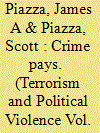

|
|
|
|
|
| Summary/Abstract |
What impact does engagement in crime have on terrorist group survival? In theory criminal activity may decrease group survival by damaging group legitimacy or prompting government crackdowns. Conversely, crime might boost group survival by facilitating access to revenues or by further taxing state policing capacity. Moreover, different types of crime might have different effects. We investigate the impact of crime on terrorist group survival using cross-sectional data on 578 terrorist groups observed between 1970 and 2007. We find that engagement in crime reduces a group’s chance of demise by around 50% and extends its lifespan by around 7 years on average. Terrorist groups involved in narcotics are less likely to end by police or military force, but are also less likely to win political concessions. We find that groups involved in extortion live the longest and are also less likely to end by force or by splintering.
|
|
|
|
|
|
|
|
|
|
|
|
|
|
|
|
| 2 |
ID:
159543
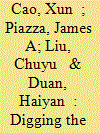

|
|
|
|
|
| Summary/Abstract |
Unrest in the Xinjiang region of China currently poses the most imminent threat to the internal security of China and to central government control over peripheral regions. Instability in Xinjiang, furthermore, has ramifications for the wider security environment in Central Asia as the conflict becomes linked with jihadist groups in other security hotspots, like Pakistan and Syria. However, our understanding of important potential factors affecting political instability in Xinjiang is limited by the lack of systematically collected event data of ethnic violence. In this article, we introduce the first effort to fill this gap in data collection, that is, the Ethnic Violence in China (EVC) Database: the Xinjiang Region. This is a geocoded database of yearly incidents of ethnic violence at the county level in Xinjiang from 1990 to 2005. Using the EVC database, we demonstrate some initial results modeling ethnic violence in Xinjiang. We find that ethnic violence is positively associated with interethnic inequality; resources such as oil and cotton, on the other hand, are unrelated to the likelihood of ethnic violence.
|
|
|
|
|
|
|
|
|
|
|
|
|
|
|
|
| 3 |
ID:
086297
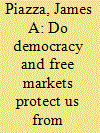

|
|
|
|
|
| Publication |
2008.
|
| Summary/Abstract |
This study empirically tests what has become a central component of US anti-terrorism policy under the Bush administration: that terrorism is a byproduct of illiberal political and economic systems. Employing a series of statistical analyses on incidents of terrorism in 153 countries from 1986 to 2003, the author finds that variables measuring democracy and degree of economic openness are not significant predictors of terrorism. However, the study does find that experience of state failures is significant, thus providing empirical backing for a small, descriptive body of scholarship linking failed states to terrorism.
|
|
|
|
|
|
|
|
|
|
|
|
|
|
|
|
| 4 |
ID:
076950
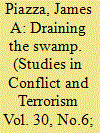

|
|
|
|
|
| Publication |
2007.
|
| Summary/Abstract |
This study empirically evaluates the question of whether or not the promotion of democracy in the Middle East will reduce terrorism, both in terms of terrorist attacks sustained by Middle Eastern countries and in terms of attacks perpetrated by terrorist groups based in Middle Eastern countries. Using a series of pooled, time-series negative binomial statistical regression models on 19 countries from 1972 to 2003 the analysis demonstrates that the more politically liberal Middle Eastern states - measured both in terms of democratic processes and in terms of civil liberties protections - are actually more prone to terrorist activity than are Middle Eastern dictatorships. The study demonstrates, furthermore, that an even more significant predictor of Middle Eastern terrorist attacks is the intensity of state failures, or episodes of severe political instability that limit central government projection of domestic authority, suffered by states in the region. States that are unable to respond to fundamental challenges to political stability posed by internal political strife, ethnic conflict or the phenomenon of "stateless areas," geographic or political spaces within states that eschew central government authority, are significantly more likely to host or sustain attacks from terrorist groups. The findings have implications for current United States antiterrorism policy toward the Middle East and provide a statistical/empirical foundation to previous studies on the relationship between terrorism and state failure.
|
|
|
|
|
|
|
|
|
|
|
|
|
|
|
|
| 5 |
ID:
088750
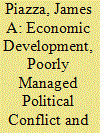

|
|
|
|
|
| Publication |
2009.
|
| Summary/Abstract |
Terrorism is frequently argued to be the product of poverty and poor levels of economic development in countries. Examining the distribution of terrorist attacks and casualties due to terrorism across the states of India, this article demonstrates that the phenomenon of terrorism is not a clear product of poor economic development but rather exacerbated by unresolved and poorly managed political conflict. Poorer states in India are not necessarily more prone to terrorism, but states that have outstanding and poorly addressed political disputes do experience a disproportionately high level of terrorist activity. This study examines six sources of political conflict that contribute to terrorism in India-separatist movements, ethnic conflict, communal conflict, the presence of scheduled castes and tribes, high population growth, and the phenomenon of stateless areas-and makes several observations on the successes and failures of Indian counterterrorism policy
|
|
|
|
|
|
|
|
|
|
|
|
|
|
|
|
| 6 |
ID:
143599
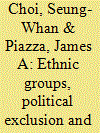

|
|
|
|
|
| Summary/Abstract |
This study examines whether the exclusion of ethnic groups from political power is an important contributing factor to domestic terrorism. To empirically test this question, we employ a negative binomial regression estimation on 130 countries during the period from 1981 to 2005. We find that countries in which certain ethnic populations are excluded from political power are significantly more likely to experience domestic terrorist attacks and to suffer from terrorist casualties; furthermore, ethnic group political exclusion is a more consistent and substantive predictor of domestic terrorist activity than general political repression or economic discrimination.
|
|
|
|
|
|
|
|
|
|
|
|
|
|
|
|
| 7 |
ID:
151150
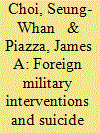

|
|
|
|
|
| Summary/Abstract |
This study examines the effect of foreign military interventions on the incidence of suicide attacks. It presents three theoretical explanations. Foreign military interventions may boost insurgent use of suicide attacks by (a) fomenting a nationalist backlash that sanctions the use of more extreme and unconventional tactics like suicide attacks, (b) providing more and better targets against which suicide attacks can be launched, or (c) prompting insurgents to use suicide tactics in order to overcome their power asymmetries and to confront better defended targets that are enhanced by interventions. We test these competing explanations using a battery of statistical tests on cross-national, time-series data for 138 countries during the period from 1981 to 2005. We find that only foreign interventions with specific features—pro-government interventions involving larger numbers of ground troops—boost suicide attacks in countries experiencing interventions. This finding suggests that by tipping the balance of power against insurgents and hardening targets in the context of assisting a local government, foreign military interventions are likely to increase the use of suicide attacks by regime challengers.
|
|
|
|
|
|
|
|
|
|
|
|
|
|
|
|
| 8 |
ID:
182542
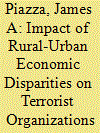

|
|
|
|
|
| Summary/Abstract |
This study investigates the influence of rural-urban economic disparities on the survival and tactical choices of resident terrorist groups. These disparities inflame social and ethnic group grievances and erode the state’s capacity to police its rural hinterlands, thereby motivating support for terrorists and providing resident terrorist groups with the ability to attack with impunity. Based on the Extended Data on Terrorist Groups (EDTG), survival analysis shows that rural-urban disparities foster terrorist group survival. Other empirical methods – negative binomial regressions and competing risk analysis – indicate how rural-urban disparities and other controls affect resident terrorist groups’ campaigns and prospects. With mediation tests, rural-urban inequalities are shown to benefit terrorist groups by increasing social group grievances and by limiting host state’s control over territory.
|
|
|
|
|
|
|
|
|
|
|
|
|
|
|
|
| 9 |
ID:
083533
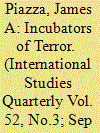

|
|
|
|
|
| Publication |
2008.
|
| Summary/Abstract |
A growing body of scholars and policymakers have raised concerns that failed and failing states pose a danger to international security because they produce conditions under which transnational terrorist groups can thrive. This study devises an empirical test of this proposition, along with counter-theories, using simple descriptive statistics and a time-series, cross-national negative binomial analysis of 197 countries from 1973 to 2003. It finds that states plagued by chronic state failures are statistically more likely to host terrorist groups that commit transnational attacks, have their nationals commit transnational attacks, and are more likely to be targeted by transnational terrorists themselves
|
|
|
|
|
|
|
|
|
|
|
|
|
|
|
|
| 10 |
ID:
147695
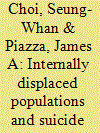

|
|
|
|
|
| Summary/Abstract |
This study asserts that countries with large internally displaced populations (IDPs) are more likely to experience a higher rate of suicide terrorism. After demonstrating this, the study tests four intervening factors hypothesized to drive the relationship between IDPs and suicide attacks: IDPs are expected (1) to increase the pool of potential suicide recruits, thereby lowering the labor costs for suicide terrorist groups; (2) to increase local ethnic conflicts that foster a favorable environment for suicide terrorism; (3) to worsen the human rights conditions in countries, prompting aggrieved people to support suicide terrorist tactics; and (4) to raise the counterterrorism and policing costs of the state, enabling terrorists to plan and execute suicide attacks. Results from negative binomial regression and Tobit models show evidence for the IDPs-suicide terrorism connection. When recursive models are employed to evaluate the effects of four intervening variables, the results most consistently support human rights violations as a significant and substantive mediator between IDPs and suicide attacks.
|
|
|
|
|
|
|
|
|
|
|
|
|
|
|
|
| 11 |
ID:
161438
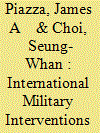

|
|
|
|
|
| Summary/Abstract |
Are states that engage in foreign military interventions vulnerable to subsequent transnational terrorist attacks? If so, do all types of foreign interventions stimulate terrorism? Using data on international military interventions for 125 to 182 countries during the period from 1970 to 2005, we demonstrate that states experience more terrorism after they engage in military interventions. In particular, politico-strategic use of military force abroad—for example, interference in another country's domestic disputes, territorial interventions, or interventions to affect local politics and policy—leads to increased subsequent transnational terrorist attacks for the intervener. In contrast, socioeconomic foreign military interventions, such as those geared toward providing humanitarian relief, protecting social groups, or securing economic interests, do not lead to an increase in transnational terrorist attacks against intervening states.
|
|
|
|
|
|
|
|
|
|
|
|
|
|
|
|
| 12 |
ID:
087354
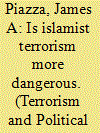

|
|
|
|
|
| Publication |
2009.
|
| Summary/Abstract |
Scholars have traditionally argued that Islamist terrorist groups tend to commit higher casualty attacks. Noting that casualty rates of attacks vary widely across Islamist terrorist groups, this study advances an alternative hypothesis that group organizational features and goal structures better explain differing casualty rates than does the overarching ideological type. Using both cross-national analysis and a case study of post-invasion Iraq, I demonstrate that there are two basic types of Islamist terrorist groups whose organizational and goal-structure features explain divergent casualty rates: "strategic groups" that function similarly to secular national-liberation and regime-change movements and "abstract/universal groups" that are affiliated with the global al-Qaeda network.
|
|
|
|
|
|
|
|
|
|
|
|
|
|
|
|
| 13 |
ID:
183012
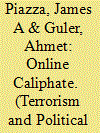

|
|
|
|
|
| Summary/Abstract |
Experts argue that the internet has provided expanded opportunities for violent extremist groups to propagandize and recruit. The Islamic State of Iraq and Syria, or ISIS, is an exemplar in that it has heavily invested in an online presence and uses online communities and social media to attract and retain supporters. Does ISIS’s online presence translate into a higher probability that individuals in its target audience will become supporters? In this study we analyze over 6,000 individuals in six Arab countries to find if those that use the internet to follow political news or to express political views are more likely to support ISIS. We find that respondents who get their news online are significantly more likely to support ISIS than those who follow the news on television or print media. Moreover, those who use online fora for political expression are also more likely to express support for ISIS. Indeed, individuals who engage in online political discussion are more likely to support ISIS than those who engage in conventional political activity, though less than those who engage in contentious political behaviors such as attending a political protest. We conclude with a brief discussion of the academic and policy implications of these findings.
|
|
|
|
|
|
|
|
|
|
|
|
|
|
|
|
| 14 |
ID:
112614
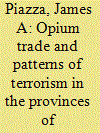

|
|
|
|
|
| Publication |
2012.
|
| Summary/Abstract |
Contemporary terrorist movements in Afghanistan are frequently alleged to be fueled, in part, by the country's voluminous opium trade. Experts argue that terrorist groups currently active in Afghanistan, like the Afghan Taliban, the Islamic Movement of Uzbekistan, Hizbul Islami, and various al-Qaeda affiliates, use drug trade profits to recruit and pay cadres, acquire weapons and equipment, and bribe officials while becoming more powerful, and deadly, in the process. This study empirically examines the relationship between the opium trade and terrorism in Afghanistan by conducting a series of negative binomial regression estimations on terrorist attacks and casualties in the 34 Afghan provinces for the period 1996 to 2008. The analysis also considers various economic development, infrastructure, geographic, security, and cultural factors when examining causes of terrorism in the provinces. The study determines that, across all model specifications, provinces that produce more opium feature higher levels of terrorist attacks and casualties due to terrorism, and that opium production is a more robust predictor of terrorism than nearly all other province features. Furthermore, tests indicate that the direction of causation runs from opium production to higher rates of terrorism, not otherwise. The study concludes with a brief discussion of the policy implications of the findings.
|
|
|
|
|
|
|
|
|
|
|
|
|
|
|
|
| 15 |
ID:
098171
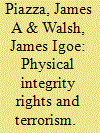

|
|
|
| 16 |
ID:
149472
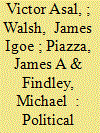

|
|
|
|
|
| Summary/Abstract |
Why do members of some ethnic groups rebel against the state? One approach holds that groups subject to exclusion from national politics engage in armed conflict. We theorize that the presence of resource wealth moderates the effect of political exclusion. Ethnic groups subject to exclusion whose settlement area includes oil wealth are more likely to experience the onset of armed conflict than groups experiencing exclusion alone. We depart from the convention of cross-national analysis to examine subnational, geocoded units of analysis—ethnic group settlement areas—to better capture the impact of natural resource distribution. Using data on ethnic group political exclusion derived from the Ethnic Power Relations database and geo-coded indicators, we conduct a series of logistic regression analyses for the years 1946 to 2005. We find that exclusion alone increase the likelihood of conflict, while the presence of oil wealth further raises the risk of war.
|
|
|
|
|
|
|
|
|
|
|
|
|
|
|
|
| 17 |
ID:
192026
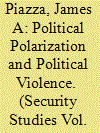

|
|
|
|
|
| Summary/Abstract |
Is political violence and support for political violence more prevalent in democratic societies with high levels of affective polarization? This study argues that affective partisan political polarization fosters dehumanization of opposing partisans, lends a moralistic and zero-sum nature to political life, and facilitates group mobilization. These all produce an environment in which political violence is both more socially acceptable and more frequent. The study tests this assertion using two sets of empirical tests: an original survey of 1,899 US residents and a cross-national time-series analysis of eighty-three democracies. It finds that in the United States, Democrats who express aversion toward Republicans are 8% more likely to express support for the use of political violence, whereas Republicans who express aversion toward Democrats are 18% more likely to endorse political violence. Furthermore, in the cross-national analysis, democracies characterized by higher levels of affective partisan political polarization are 34% more likely to experience frequent political violence.
|
|
|
|
|
|
|
|
|
|
|
|
|
|
|
|
| 18 |
ID:
106025
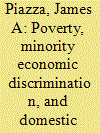

|
|
|
|
|
| Publication |
2011.
|
| Summary/Abstract |
Recognizing that the empirical literature of the past several years has produced an inconclusive picture, this study revisits the relationship between poverty and terrorism and suggests a new factor to explain patterns of domestic terrorism: minority economic discrimination. Central to this study is the argument that because terrorism is not a mass phenomenon but rather is undertaken by politically marginal actors with often narrow constituencies, the economic status of subnational groups is a crucial potential predictor of attacks. Using data from the Minorities at Risk project, I determine that countries featuring minority group economic discrimination are significantly more likely to experience domestic terrorist attacks, whereas countries lacking minority groups or whose minorities do not face discrimination are significantly less likely to experience terrorism. I also find minority economic discrimination to be a strong and substantive predictor of domestic terrorism vis-à-vis the general level of economic development. I conclude with a discussion of the implications of the findings for scholarship on terrorism and for counter-terrorism policy.
|
|
|
|
|
|
|
|
|
|
|
|
|
|
|
|
| 19 |
ID:
154542
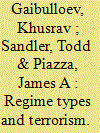

|
|
|
|
|
| Summary/Abstract |
Regime type has opposing effects on terrorism. If a regime constrains the executive branch, then terrorism may be more prevalent. If, however, a regime allows all viewpoints to be represented, then grievances may be held in check, resulting in less terrorism. Regimes that value constituents’ lives and property will also act to limit attacks. We formulate a game-theoretic model, containing a terrorist group and targeted government, that captures these opposing forces and supports a nonlinear relationship between regime type and terrorism. This model indicates how diverse samples in the literature can result in different relationships between regime type and terrorism. Seldom does it support the positive relationship that is prevalent in the terrorism literature. We apply a large variety of empirical techniques to show that regime type has a robust inverted U-shaped impact on various terrorism measures. Foreign policy variables (e.g., alliance with the United States) are not a robust influence on terrorism.
|
|
|
|
|
|
|
|
|
|
|
|
|
|
|
|
| 20 |
ID:
152864
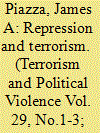

|
|
|
|
|
| Summary/Abstract |
While some scholars have theorized that repression reduces terrorism because it raises the costs of participating in terrorist activity by dissidents, others argue that repression stimulates terrorism by either closing off nonviolent avenues for expressing dissent or by provoking or sharpening grievances within a population. This study investigates these contradictory sets of expectations by considering whether or not different specific types of repression yield different effects on patterns of terrorism in 149 countries for the period 1981 to 2006. By assessing the impact of nine specific types of repression on domestic terrorism, the study produces some interesting findings: while, as expected, forms of repression that close off nonviolent avenues of dissent and boost group grievances increase the amount of domestic terrorism a country faces, types of repression that raise the costs of terrorist activity have no discernible suppressing effect on terrorism.
|
|
|
|
|
|
|
|
|
|
|
|
|
|
|
|
|
|
|
|
|